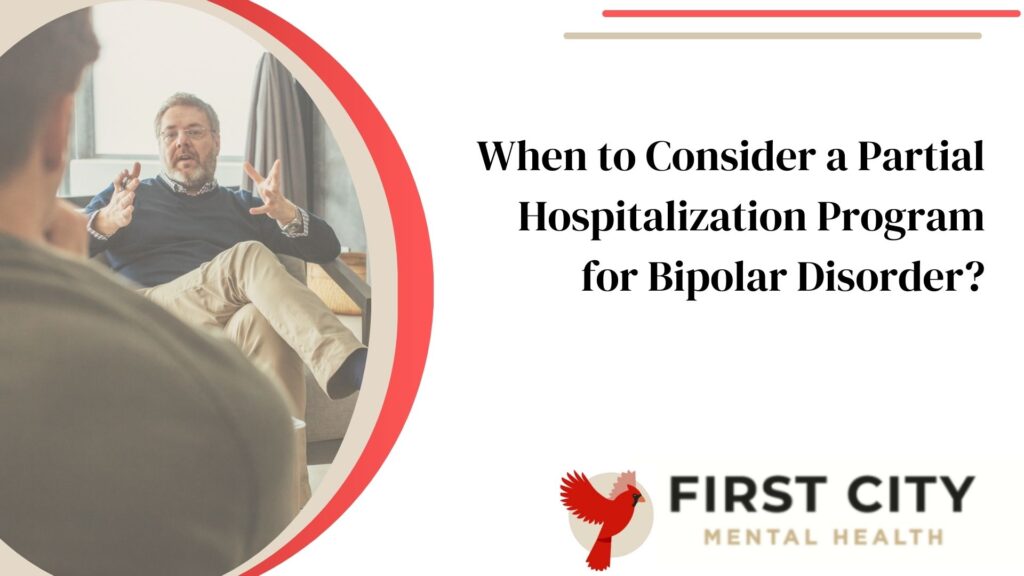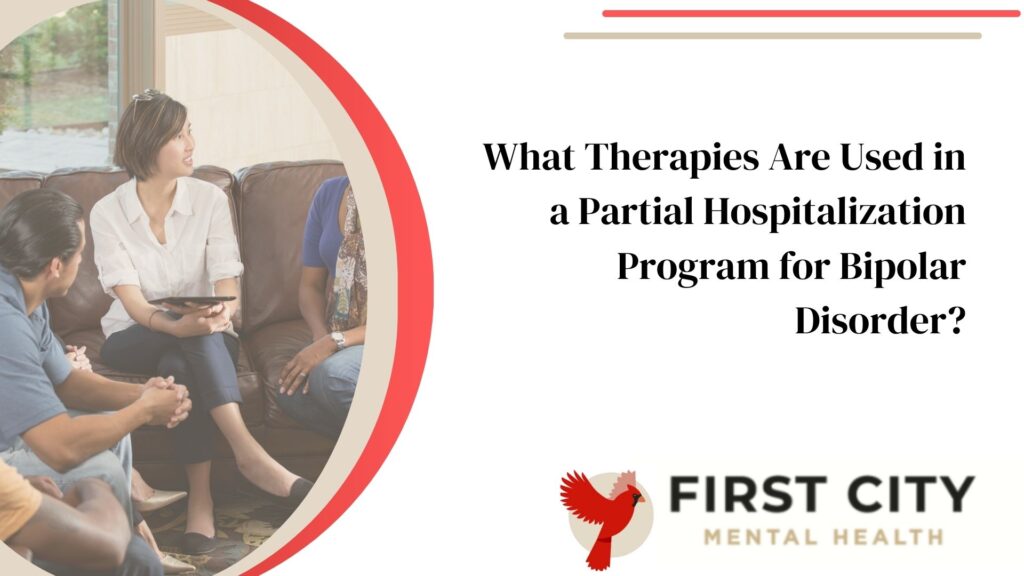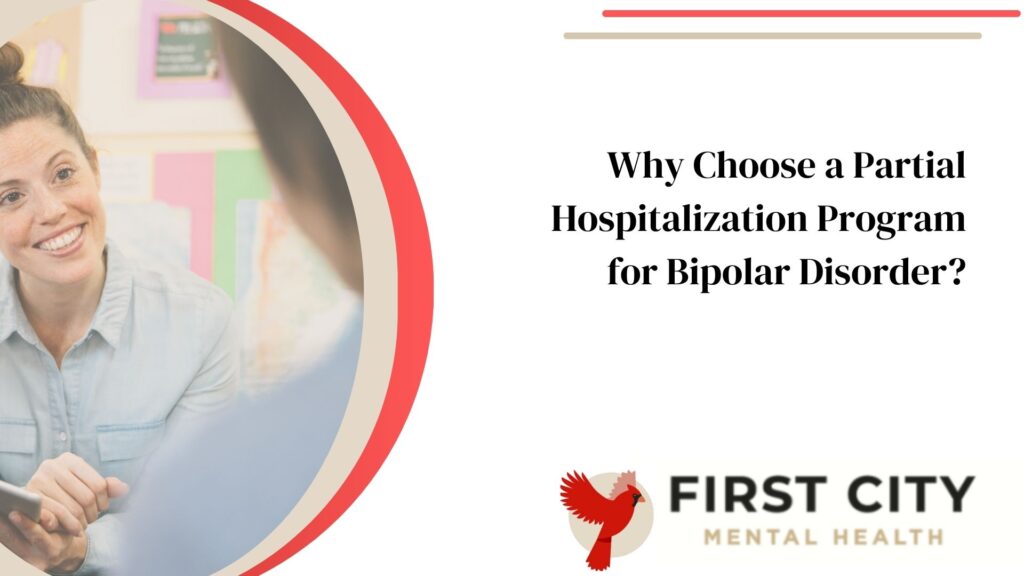
Why Choose Intensive Outpatient Indiana?
August 20, 2025
How to Maximize Benefits from an Intensive Outpatient Indiana Program?
August 25, 2025Dealing with bipolar disorder can be challenging for both the affected individuals and their families. The rollercoaster of emotions, from extreme highs to severe lows, often makes it hard to maintain a stable lifestyle.
Finding the right treatment program is crucial in managing this mental health condition.
Did you know that a Partial Hospitalization Program (PHP) offers intensive care while allowing patients to live at home? This option strikes a balance between inpatient hospitalization and outpatient therapy.
This article will explore why choosing a partial hospitalization program might be the best decision for those struggling with bipolar disorder. We will explore its benefits, the therapies included, and how it integrates with long-term treatment plans.
Keep reading!
Key Takeaways
- Partial hospitalization programs provide a structured environment for managing bipolar disorder, offering intensive treatment during the day while allowing patients to live at home.
- These programs include group therapy, individual therapy, and medication management, helping stabilize mental health and promote independent living.
- Patients can attend school or return to work with ongoing professional support from PHPs.
What Are the Benefits of a Partial Hospitalization Program for Bipolar Disorder?
Partial hospitalization program Kokomo (PHP) offers a structured environment for managing bipolar disorder. Patients can live at home, providing the comfort of family support while receiving intensive treatment during the day.
This balance helps individuals reintegrate into society without feeling overwhelmed. PHP includes group therapy, individual therapy, and medication management, which work together to stabilize mental health.
Patients in these programs benefit from learning life skills that promote independent living. With ongoing professional support, they attend school or return to work more confidently.
Focusing on daily functioning ensures that individuals manage their symptoms effectively and meet their personal goals. This combination of therapies and real-life applications is crucial in helping patients achieve a stable and productive life.
When to Consider a Partial Hospitalization Program for Bipolar Disorder?

Patients should think about mental health Partial Hospitalization Program (PHP) for Bipolar Disorder after finishing residential treatment. This step helps stabilize mental health before transitioning to outpatient care.
Usually lasting between 30-45 days, PHP provides more intensive treatment than regular outpatient programs and supports the patient in reintegrating into society.
PHP can significantly benefit individuals who still need structured support but do not require full-time Hospitalization. It’s also suitable for patients facing significant challenges that impede their daily functioning but who wish to return home each day.
Mental health partial hospitalization programs aim to help adult patients achieve stability and independence while providing access to therapists, counselors, and group therapy sessions.
Where to Find a Partial Hospitalization Program for Bipolar Disorder Treatment?
First City Mental Health offers a comprehensive Partial Hospitalization Program Mental Health (MH PHP) designed for individuals with bipolar disorder. This facility is in Indiana and provides essential care for adults ready to transition from a residential program.
Patients can live in community or sober housing off-site while attending therapeutic programming for 6-8 hours daily.
Indiana hosts several other treatment centers that offer adult partial hospitalization programs tailored specifically for bipolar disorder. Reaching out to local hospitals and mental health clinics is beneficial for finding these services.
Many insurance companies also provide lists of in-network providers specializing in partial hospitalization programs (PHP). Direct contact with treatment centers will help determine if they meet individual needs and the specific requirements for participation.
What Therapies Are Used in a Partial Hospitalization Program for Bipolar Disorder?

Partial hospitalization program (PHP) for bipolar disorder include various effective therapies. Group therapy provides a space where individuals can share experiences and learn coping strategies from peers facing similar challenges.
Patients also benefit from individual therapy sessions that help address personal mental health concerns in a more private setting.
Medication management plays a critical role in stabilizing mood swings and other symptoms of bipolar disorder. A treatment team, including psychiatrists and nurses, closely monitors medication effectiveness and adjusts dosages as needed.
Additional support, like dialectical behavioral therapy, helps individuals develop skills to manage emotions better and reduce impulsive behaviors.
What to Expect in a Partial Hospitalization Program for Bipolar Disorder?
Transitioning from the therapies used, here’s what to expect in an Indiana Partial Hospitalization Program for Bipolar Disorder. The program is structured to provide intensive care while allowing patients to live at home and maintain some independence.
Program Duration: Typically, the program lasts 30-45 days and serves as a transition from Residential treatment to outpatient care.
Daily Schedule: Patients participate in therapeutic programming for 6-8 hours each day, excluding holidays. This structured schedule helps maintain consistency in their daily lives.
Living Arrangements: Patients live in the community or sober housing off-site while attending the day program. This allows them to practice independent living skills in a supportive environment.
Therapeutic Components: The program includes group therapy, individual therapy, and medication management. These components work together to stabilize mental health and promote independent living.
Goal-Oriented Approach: Treatment goals focus on helping individuals return to work or school and manage daily activities without feeling overwhelmed by their mental illness.
Support Services: In addition to therapy, patients receive other types of support, such as life skills training and coping strategies. These services are designed to support their success and reintegration into society.
Team-Based Care: A team of mental health professionals monitors progress and makes adjustments as needed. This team approach ensures comprehensive care tailored to each patient’s needs.
Community Integration: The program supports patients’ reintegration into society after completing a Residential Program by providing intensive yet flexible care options.
How a Partial Hospitalization Program Integrates with Long-Term Bipolar Disorder Treatment?
A Partial Hospitalization Program (PHP) serves as a critical bridge between residential care and outpatient treatment for individuals with bipolar disorder. After completing an intensive residential program, patients transition to PHP to receive structured support while living at home.
This setup helps maintain the progress made in inpatient care and reduces the risk of relapse during reintegration into everyday life.
In PHP, patients engage in therapeutic programming for 6-8 hours daily, which includes individual and group therapy sessions, medication management, and life skills training. These programs focus on stabilizing mental health so that patients can live independently.
Consistent monitoring ensures any necessary adjustments to medication or therapy approaches are addressed promptly. By offering intensive yet flexible care, Partial Hospitalization Programs lay the groundwork for sustainable long-term treatment success for those managing bipolar disorder.
Why Family Involvement Is Crucial in a Partial Hospitalization Program for Bipolar Disorder?
Family involvement is crucial in adult partial hospitalization program (PHP) for bipolar disorder because it fosters a supportive environment that aids in recovery. These programs aim to stabilize mental health and promote independent living, where family members play an essential role.
They provide emotional support, help manage medications, and assist with reintegrating life skills. Family participation increases the likelihood of long-term success by creating a stable framework for individuals during treatment.
Patients typically live off-site in community or sober housing while attending PHP sessions. This arrangement requires family involvement to ensure a consistent and nurturing home environment.
Loved ones’ participation can also enhance therapeutic programming, such as individual and group therapy sessions, by offering additional perspectives and emotional backing. A robust family support system boosts the patient’s morale and creates a sense of community and connection during their treatment journey.
Why Choose a Partial Hospitalization Program for Bipolar Disorder?

Support from family members can significantly improve outcomes in a Partial Hospitalization Program in Indiana (PHP) for bipolar disorder. Moving forward, choosing a PHP over other treatments might be necessary when patients need intensive care but can still safely live at home.
This level of treatment suits those who have completed residential programs and are ready to transition while receiving structured support.
A Partial Hospitalization Program (PHP) is ideal for individuals requiring more than outpatient therapy yet less than full-time inpatient care. During the day, patients participating in PHPs benefit from group and individual therapy, medication management, and skill-building activities while returning home in the evening.
These programs also help manage daily life pressures without overwhelming the patient, gradually making returning to work or school easier. In Indiana, several partial hospitalization options exist that cater specifically to mental health needs, ensuring patients receive comprehensive support tailored to their unique situations.
Conclusion
Partial hospitalization program (PHP) for bipolar disorder offer a structured and supportive environment. These programs provide intensive care while allowing patients to live at home.
PHP’s critical components are group therapy, individual counseling, and medication management. Patients can gain valuable life skills that promote independent living, and family involvement enhances the support system needed for recovery.
Consider PHP as a bridge between residential treatment and full reintegration into daily life.
F.A.Q.s
What is a partial hospitalization program (PHP) for bipolar disorder?
A partial hospitalization program (PHP) for bipolar disorder offers structured mental health treatment without overnight stays.
How does the referral process work for a PHP in Indiana?
Your doctor can refer patients to an Indiana partial hospitalization program by contacting the facility directly or through your insurance company.
Are out-of-pocket costs high for a PHP?
Out-of-pocket costs depend on your insurance coverage and the specific services provided during each treatment day.
Does a PHP help with substance issues alongside bipolar disorder?
Yes, many partial hospitalization programs address both mental health and substance use concerns within their weekly schedules.
Is there good insurance coverage for partial Hospitalization in Kokomo, Indiana?
Most insurance companies provide coverage options, but you should check with them to understand what they will cover specifically in Kokomo, Indiana.






